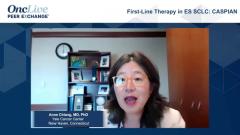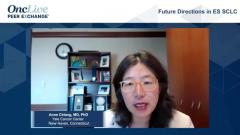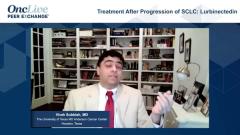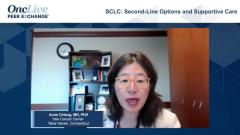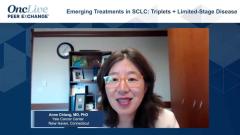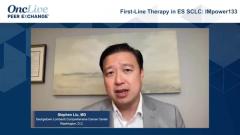
First-Line Therapy in ES SCLS: KEYNOTE-604
Key opinion leader in lung cancer, Vivek Subbiah, MD, examines the phase 3 KEYNOTE-604 trial of platinum-based chemotherapy + pembrolizumab and considers whether the data support findings from other trials of chemotherapy + IO combination approaches.
Episodes in this series

Hossein Borghaei, DO, MS: Vivek, we’re going to give you something a little more difficult: KEYNOTE-604, the only 1 of the big, randomized phase 3 studies that didn’t hit its predefined statistical end points. I’m wondering if you can comment on the study and give your impression of the data.
Vivek Subbiah, MD: Thank you for the opportunity. As we all know, pembrolizumab, PD-1 inhibitor monotherapy, has shown anti-tumor activity in patients with small cell lung cancer. This was shown in the data from the KEYNOTE-028 and KEYNOTE-158 studies. The randomized double-blind phase 3 KEYNOTE-604 study compared placebo plus cisplatin and etoposide vs pembrolizumab plus etoposide and platinum in patients with previously untreated extensive-stage small cell lung cancer. Eligible patients were randomized 1:1 to pembrolizumab, 200 mg once daily every 3 weeks, or a saline-based placebo for up to 33 cycles plus 4 cycles of etoposide-platinum. The primary end points were PFS [progression-free survival] and OS [overall survival] in the intent-to-treat population. They enrolled around 453 participants; 228 were randomly assigned to pembrolizumab plus etoposide-platinum, and 225 patients to placebo plus etoposide-platinum.
Pembrolizumab plus platinum-etoposide significantly improved PFS. The hazard ratio was 0.75. The 12-month PFS estimate was 13.6% with pembrolizumab plus etoposide-platinum and 3.1% with placebo plus etoposide-platinum. Although pembrolizumab plus etoposide-platinum prolonged the overall survival, the overall survival estimates were 22.5 months and 12.2 months. The significant threshold for the overall survival was not met.
What’s the conclusion from this study? Pembrolizumab plus platinum-etoposide significantly improved the PFS compared with placebo plus etoposide-platinum as first-line therapy for patients with extensive-stage small cell lung cancer. They didn’t see any unexpected toxicities as seen with pembrolizumab plus etoposide-platinum. What did we gain from this? Although the addition of pembrolizumab to platinum-etoposide didn’t significantly improve the overall survival, it significantly prolonged the time patients lived without disease progression. The adverse-event profile of pembrolizumab plus etoposide-platinum was as expected and generally manageable.
What’s the clinical relevance of the study? We thank all the motivated patients, investigators, and the entire staff for enrolling in this study. They showed that pembrolizumab has clinical activity in extensive-stage small cell lung cancer as well as an adverse-event profile that allows it to be combined with other therapies. There’s value in exploring pembrolizumab in combination with other therapies in patients with small cell lung cancer to hopefully identify a future regimen that significantly prolongs the overall survival.
TRANSCRIPT EDITED FOR CLARITY


